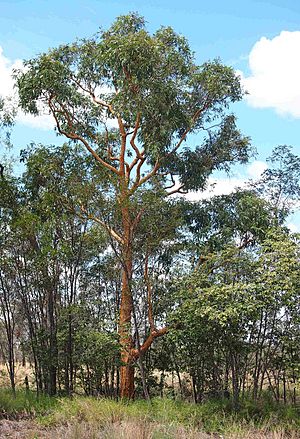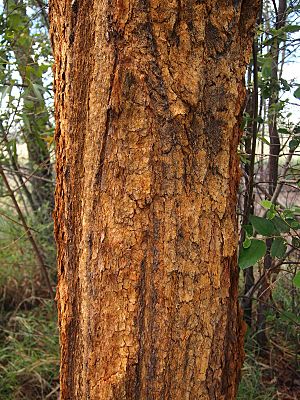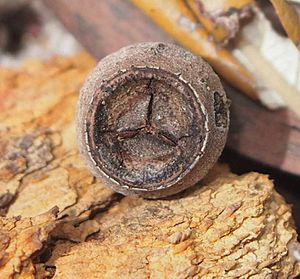Inland yellowjacket facts for kids
Quick facts for kids Inland yellowjacket |
|
|---|---|
 |
|
| Scientific classification |
|
| Kingdom: | Plantae |
| Clade: | Tracheophytes |
| Clade: | Angiosperms |
| Clade: | Eudicots |
| Clade: | Rosids |
| Order: | Myrtales |
| Family: | Myrtaceae |
| Genus: | Eucalyptus |
| Species: |
E. similis
|
| Binomial name | |
| Eucalyptus similis |
|
| Script error: The function "autoWithCaption" does not exist. | |
Script error: No such module "Check for conflicting parameters".
The Inland Yellowjacket (scientific name: Eucalyptus similis) is a special type of eucalypt tree. It is also known as the Queensland Yellowjacket. This tree naturally grows in Queensland, Australia.
Contents
What Does the Inland Yellowjacket Look Like?
This tree is usually a medium size, growing about 8 to 14 meters (26 to 46 feet) tall. Its bark is very unique! It can be yellow-brown, orange, or even bright yellow. The bark stays on the tree and has a cool pattern, almost like a puzzle. It can also look flaky, with white spots. Sometimes, it sheds in small pieces or ribbons.
The leaves of the Inland Yellowjacket are shiny green or grey-green. They are shaped like a spear, about 8 to 12 centimeters (3 to 5 inches) long and 1.5 to 2.5 centimeters (0.6 to 1 inch) wide.
Flowers and Fruit
When the tree blooms in December, it gets pretty white or cream-colored flowers. These flowers are small, about 1.5 centimeters (0.6 inches) across. After the flowers, the tree grows interesting fruit. These fruits are woody capsules, shaped like a cup or cylinder. They are about 10 to 12 millimeters (0.4 to 0.5 inches) long and 8 to 10 millimeters (0.3 to 0.4 inches) wide. Inside these capsules are tiny grey seeds.
Where Does the Inland Yellowjacket Grow?
You can find the Inland Yellowjacket tree growing in woodlands. It likes gentle slopes and flat areas. It grows well in deep clay, loamy, or sandy soils.
This tree's home stretches across a large part of Queensland. It grows from Jericho in Central Queensland all the way north to Laura on Cape York.
It often grows alongside another tree called Corymbia setosa. In the areas where it grows, you might also see other plants like Lithomyrtus microphylla and Carissa lanceolata.
How is it Used?
The Inland Yellowjacket tree can be grown from its seeds. It is a good choice for planting in drier areas. People sometimes plant it as a small shade tree, especially in places with loamy or sandy soils.
 | Delilah Pierce |
 | Gordon Parks |
 | Augusta Savage |
 | Charles Ethan Porter |



